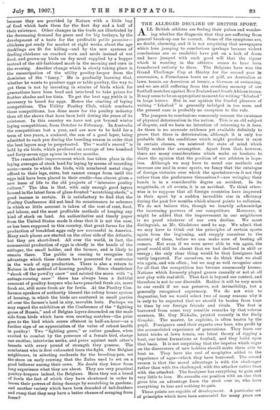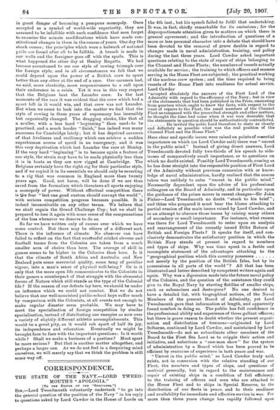THE ALLEGED DECLINE OF BRITISH SPORT.
ALL British athletes are feeling their pulses and wonder- ing whether the diagnosis that they are suffering from general break-up can be correct. Some of the symptoms are, no doubt, alarming, and it is not surprising that newspapers which love jumping to conclusions (perhaps because violent conclusions are so readable) have put on a look of doom and have jumped with such good will that the vigour which is wanting in the athletes seems to have been transferred entirely to them. The Belgians have won the Grand Challenge Cup at Henley for the second year in succession, a Frenchman beats us at golf, an Australian at lawn tennis, an American at tennis, a German at swimming, and we are still suffering from the crushing memory of our football matches against New Zealand and South African teams. It may seem to be an appropriate moment for writing "Ichabod " in large letters. But in our opinion the fearful pleasure of writing " Ichabod " is generally indulged in too soon, and the present case is probably no exception to the rule.
The jumpers to conclusions commonly assume the existence of physical deterioration in the nation. This is an old subject of dispute, and we have no intention of returning to it here. As there is no accurate evidence yet available definitely to prove that there is deterioration, although it is only too probable that the conditions which might produce it exist in certain classes, we mistrust the state of mind which boldly makes the assumption. Apart from that, however, there are many considerations which make us hesitate to share the opinion that the position of our athletes is hope- less. Although we may have to mend our methods and increase our zeal in some sports, we fancy that the catalogue of foreign victories over which the spectators—is it not they rather than the performers themselves P—are wringing their hands is in a considerable degree an accident. In its magnitude, at all events, it is an accident. To think other- wise is to suppose that all foreign countries have improved in their sport by a sudden incredible rise it} efficiency during the past few months which almost points to collusion. We do not believe this, though we heartily acknowledge the increasing prowess of our competitors. Moreover, it might be added that the improvement in our neighbours is no proof whatever of our own decline. We must distinguish, as Mr. Gladstone used to say. We admit that we may have to think out the principles of certain sports again from the beginning, and reapply ourselves to the mastery of them, before we can make sure of beating all comers. But even if we were never able to win again, the proof would still be absent that we had declined in skill or energy ; the only clear thing would be that foreigners had vastly improved. For ourselves, we do think that we shall win again, and win often ; but we may as well recognise once for all that the competition has become enermously keener. Nations which formerly played games casually or not at all now play with real skill. That fact is beyond our control, and therefore is not to our discredit. Rather it will be very much to our credit if we can preserve, not invincibility, but a generally recognised supremacy. We do not wish to dogmatise, but we would select two of many reasons why it is only to be expected that we should be beaten from time to time by our foreign friends and rivals. The first is borrowed from some very sensible remarks by that veteran oarsman, Mr. Guy Nickalls, printed recently in the Daily Graphic. The master, he explains, is often beaten by the pupil. Foreigners send their experts over here, who profit by the accumulated experience of generations. They learn our latest tricks at lawn tennis, our latest theory of rigging a boat, our latest formations at football, and they build upon that basis. It is not surprising that the impetus which urges on the discoverers of new hobbies should make them able to beat us. They have the zeal of neophytes added to the experience of ages—which they have borrowed. The second reason is that the moral advantage is with the challenger rather than with the challenged, with the attacker rather than with the attacked. The foreigner has everything to gain and very little to lose. He assaults our position with an élan that gives him an advantage from the start over us, who have everything to lose and nothing to gain.
These points are capable of development. A particular set of principles which have been successful for many years are in great danger of becoming a pompous monopoly. Once accepted as a symbol of world-wide superiority, they are assumed to be infallible with such confidence that men forget to examine the minute modifications which have made con- stitutional changes in them in the course of years. One day the shock comes ; the principles which were a bulwark of national pride are found after all to be fallible. A breach is made in our walls and the foreigner goes off with the spoils. This is what happened the other day at Henley Regatta. We had become accustomed to see our style of rowing triumph over the foreign style, and in all circumstances we felt that we could depend upon the power of a British crew to spurt better than any other at the end of a race. Our oarsmen had, we said, more elasticity, more responsiveness to a call upon their endurance in a crisis. Yet it was in this very respect that the Belgians beat the Leander crew. In the last moments of the race it was evident that the crew which had a spurt left in it would win, and that crew was not Leander. -But when we come to look into the matter we find that the style of rowing in these years of supremacy has insensibly but organically changed. The dragging stroke, like that of a sculler, with a less hard " beginning " than used. to be practised, and a much harder "finish," has indeed won many successes for Cambridge lately; but it has deprived oarsmen of that liveliness and resiliency which can achieve a sudden 'superhuman access of speed in an emergency, and it was this very deprivation which lost Leander the race at Henley. If the very hard " beginning " is to become again a feature of our style, the strain may have to be made physically less than it is in boats as they are now rigged at Cambridge. The Belgians certainly have the right rig for their particular style, and if we copied it in its essentials we should only be reverting to a rig that was common in England more than twenty years ago. Good, not harm, will be done if we are thus saved from the formalism which threatens all sports enjoying a monopoly of power. Without effectual competition there is the fear "lest one good custom should corrupt the world"; with serious competition progress becomes possible. It is indeed inconceivable on any other terms. We believe that we shall regain the Grand Challenge Cup ; but we shall be prepared to lose it again with some sense of the compensations of the loss whenever we deserve to do so.
So far we have written only of causes over which we have some control. But there may be others of a different sort. There is the influence of climate. No observer can have failed to reflect on the fact that succtssful cricket elevens and football teams from the Colonies are taken from a much smaller area of choice than here. The average of skill in 'games seems to be higher in the Colonies than here. Is it that the climate of South Africa and Australia and New Zealand puts some mercurial quality, some tang of peculiar vigour, into a man's sense of physical well-being ? Or is it only that the more open life communicates to the Colonists in their games a counterpart of that struggle with the elemental forces of Nature which still stands as the type of the Colonial life ? If the reason of our defeats lay here, we should be under an influence which we could not combat. But we do not 'believe that our well-nourished public-school boys suffer much by comparison with the Colonists, at all events not enough to make regular disaster seem probable. We may have to meet the specialisation of foreign competition by similar specialisation, instead of distributing our energies as now over a variety of slightly different athletic accomplishments. This 'would be a great pity, as it would rob sport of half its joy, its independence and relaxation. Eventually we might be brought face to face with the important questions : Is it worth while ? Shall we make a business of a pastime? Must sport be more serious ? But that is another matter altogether, and perhaps a larger one. As we do not feel in a despairing mind ourselves, we will merely say that we think the problem is still some way off.







































 Previous page
Previous page